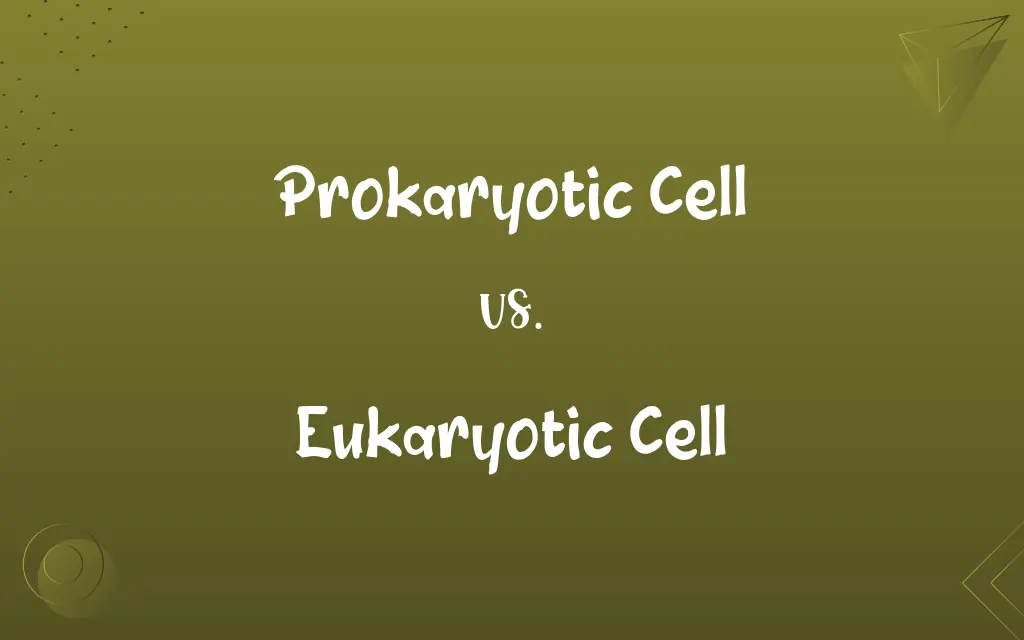Prokaryotic Cell vs. Eukaryotic Cell: Know the Difference

By Shumaila Saeed || Updated on December 26, 2023
Prokaryotic cells are simple, lacking a nucleus and organelles, found in bacteria and archaea; eukaryotic cells have a nucleus and organelles, found in plants, animals, and fungi.

Key Differences
Prokaryotic cells are characterized by their simplicity, lacking a defined nucleus and membrane-bound organelles. In contrast, eukaryotic cells possess a true nucleus enclosed by a nuclear membrane, along with various specialized organelles.
Shumaila Saeed
Dec 25, 2023
The DNA in prokaryotic cells is typically a single, circular chromosome located in a region called the nucleoid. Eukaryotic cells, however, have multiple linear chromosomes contained within the nucleus, offering more complex genetic regulation.
Shumaila Saeed
Dec 25, 2023
Prokaryotic cells are generally smaller in size and have a simpler structure, making them efficient in rapid growth and replication. Eukaryotic cells are larger and more complex, allowing for greater specialization and multicellular organization.
Shumaila Saeed
Dec 25, 2023
Cell division in prokaryotic cells occurs through binary fission, a simpler and quicker process. In eukaryotic cells, cell division is more complex, involving either mitosis or meiosis, processes that ensure genetic diversity and fidelity.
Shumaila Saeed
Dec 25, 2023
In terms of energy production, prokaryotic cells often have cell membranes adapted for this purpose, while eukaryotic cells use membrane-bound organelles like mitochondria (and chloroplasts in plants) for energy production, indicating a higher level of complexity and efficiency.
Shumaila Saeed
Dec 25, 2023
ADVERTISEMENT
Comparison Chart
Nucleus
No true nucleus; DNA in nucleoid
Defined nucleus with nuclear membrane
Shumaila Saeed
Dec 25, 2023
Organelles
No membrane-bound organelles
Membrane-bound organelles (e.g., mitochondria)
Shumaila Saeed
Dec 25, 2023
ADVERTISEMENT
Multicellularity
Usually single-celled
Often multi-celled (can be single-celled)
Shumaila Saeed
Dec 25, 2023
Metabolic Processes
Varied, often in cell membrane
In specialized organelles (e.g., chloroplasts)
Shumaila Saeed
Dec 25, 2023
ADVERTISEMENT
Prokaryotic Cell and Eukaryotic Cell Definitions
Prokaryotic Cell
Simple, single-celled organism without a nucleus.
Bacteria in the human gut are prokaryotic cells aiding in digestion.
Shumaila Saeed
Dec 13, 2023
Eukaryotic Cell
Advanced cell with organelles for specific functions.
Neurons in the brain are eukaryotic cells specialized in signal transmission.
Shumaila Saeed
Dec 13, 2023
Prokaryotic Cell
Single-celled life form with a simple cellular structure.
Prokaryotic cells in E. coli bacteria can cause food poisoning.
Shumaila Saeed
Dec 13, 2023
Eukaryotic Cell
Cell type found in animals, plants, and fungi with a nucleus.
The eukaryotic cells of an oak tree perform photosynthesis.
Shumaila Saeed
Dec 13, 2023
Prokaryotic Cell
Cell type characterized by absence of membrane-bound organelles.
The prokaryotic cells of cyanobacteria perform photosynthesis.
Shumaila Saeed
Dec 13, 2023
Eukaryotic Cell
Larger cell with multiple chromosomes in a nuclear membrane.
Eukaryotic cells in muscle tissue contract to enable movement.
Shumaila Saeed
Dec 13, 2023
Prokaryotic Cell
Smaller, more primitive cell with DNA in a nucleoid.
Prokaryotic cells in yogurt are responsible for fermentation.
Shumaila Saeed
Dec 13, 2023
Eukaryotic Cell
Complex cell with a true nucleus and organelles.
Human skin cells are eukaryotic cells with specialized functions.
Shumaila Saeed
Dec 13, 2023
Prokaryotic Cell
Microbial cell lacking a defined nucleus.
Soil bacteria consist of prokaryotic cells that help in nutrient cycling.
Shumaila Saeed
Dec 13, 2023
Eukaryotic Cell
Cellular structure capable of forming multi-cellular organisms.
Eukaryotic cells in algae form complex, multicellular structures.
Shumaila Saeed
Dec 13, 2023
Repeatedly Asked Queries
Can eukaryotic cells be multicellular?
Yes, they can form complex multicellular organisms.
Shumaila Saeed
Dec 25, 2023
How do prokaryotic and eukaryotic cells reproduce?
Prokaryotic cells reproduce by binary fission; eukaryotic cells use mitosis or meiosis.
Shumaila Saeed
Dec 25, 2023
Do prokaryotic cells have mitochondria?
No, they lack membrane-bound organelles like mitochondria.
Shumaila Saeed
Dec 25, 2023
What is the genetic material in prokaryotic cells?
Prokaryotic cells contain a single, circular DNA molecule as their genetic material.
Shumaila Saeed
Dec 25, 2023
Are prokaryotic cells single-celled?
Yes, they are typically single-celled organisms.
Shumaila Saeed
Dec 25, 2023
What organisms have prokaryotic cells?
Bacteria and archaea are composed of prokaryotic cells.
Shumaila Saeed
Dec 25, 2023
What defines a prokaryotic cell?
A simple cell without a nucleus or membrane-bound organelles.
Shumaila Saeed
Dec 25, 2023
What is a key feature of eukaryotic cells?
The presence of a true nucleus and specialized organelles.
Shumaila Saeed
Dec 25, 2023
How does DNA differ in these cell types?
Prokaryotic cells have a single, circular chromosome, while eukaryotic cells have multiple, linear chromosomes.
Shumaila Saeed
Dec 25, 2023
What is the size range of eukaryotic cells?
Eukaryotic cells are generally larger, ranging from 10 to 100 micrometers in size.
Shumaila Saeed
Dec 25, 2023
What is the size difference between these cells?
Prokaryotic cells are generally smaller than eukaryotic cells.
Shumaila Saeed
Dec 25, 2023
Can eukaryotic cells be single-celled?
Yes, some eukaryotes like certain algae and protists are single-celled.
Shumaila Saeed
Dec 25, 2023
Do eukaryotic cells have ribosomes?
Yes, eukaryotic cells have ribosomes for protein synthesis.
Shumaila Saeed
Dec 25, 2023
How do eukaryotic cells reproduce?
Eukaryotic cells reproduce through mitosis for growth and asexual reproduction and meiosis for sexual reproduction.
Shumaila Saeed
Dec 25, 2023
Do prokaryotic cells have a plasma membrane?
Yes, prokaryotic cells have a plasma membrane that separates the cell from its environment.
Shumaila Saeed
Dec 25, 2023
Share this page
Link for your blog / website
HTML
Link to share via messenger
About Author
Written by
Shumaila SaeedShumaila Saeed, an expert content creator with 6 years of experience, specializes in distilling complex topics into easily digestible comparisons, shining a light on the nuances that both inform and educate readers with clarity and accuracy.








































































